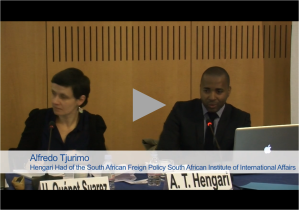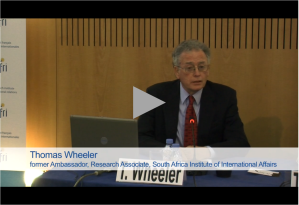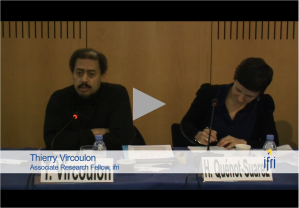This article is the third and last part of the synthesis report of a conference which took place on November 22nd, 2013 at Ifri, Paris. The event was jointly organized by the South African Institute of International Affairs (SAIIA), the French Institute in South Africa (IFAS), and the French Institute of International Relations (Ifri). It was part of the South Africa – France Seasons 2012 & 2013, www.france‐southafrica.com.
South Africa on the International Scene, New Horizons?
The South African foreign diplomacy evolution over the past 25 years
By Thomas Wheeler, former Ambassador of South Africa (1961-2003), Research Associate, South African Institute of International Affairs, Johannesburg
Thomas Wheeler portrayed the evolution of South Africa foreign diplomacy since the end of the apartheid. In the 1980s, South Africa was in great isolation and its financial situation was critical. After the release of Mandela and legalization of the ANC in 1990, bilateral relations started with many countries, such as Russia, Turkey and Thailand. De Klerk President also launched a serious program to dismantle South Africa nuclear weapons. After Mandela’s election, de Klerk remained involved in the shaping of foreign policy, along the lines established by Mandela (human rights, democracy, equity and sustainable development). After 1999, Mbeki became a “foreign policy president”, with little interest given to domestic issues. He put a particular emphasis on the concept of African Renaissance, supporting the transformation of the OAU into African Union, the creation of the NEPAD, and worked to establish South-South cooperation. Zuma’s foreign policy, from 2009 on, is rather “care and maintenance” of Mbeki’s inheritance; he leans a lot on his administration, as well as think-tanks and NGOs to assist the shaping of the policies. One of Zuma’s greatest successes was the integration of South Africa to the BRICS. In 2007-2009 and then 2011-2012, South Africa occupied a non permanent seat at the Security Council, for the first time since 1945. The country has been very involved in multilateral process and interventions of all kinds, from climate international negotiations to peace-keeping missions. In conclusion, in 20 years of democracy, South Africa has shifted from a pariah state to a leader of the African and developing world.
South Africa and the African Agenda as a centre-piece of its foreign policy
By Alfredo Tjiurimo Hengari, Head of the South African Foreign Policy and African Drivers Programme, South African Institute of International Affairs, Johannesburg
Alfredo Tjiurimo emphasized that three phases shaped the identity of post-apartheid South Africa foreign policy on the African continent. First as from 1992, Mandela focused is external relations on democracy and human rights promotion, based on his personal experience of apartheid. This position met resistances on the continent, some African leaders condemning its hegemonic and dogmatic tendency. After 1992, Mbeki promoted a “multilateralisation of these norms”, incorporating them within a broader continental vision, which translated in the creation of the African Union and of the NEPAD. Finally, Zuma’s positions on the continent are less ideological and more pragmatic. They still have to deal with an internal tension between a very liberal view of foreign diplomacy (based on human rights and democracy) and an anti-colonial position. This paradox forces South Africa to take positions that sometimes contradict its own values, like in the Cote d’Ivoire case. Today, South Africa has become a respected country in international affairs that participates in many multilateral initiatives and can play a prominent role on the African continent.

 The role of South Africa in conflict management in Africa
The role of South Africa in conflict management in Africa
By Thierry Vircoulon, Associate Research Fellow, Ifri, Paris
Thierry Vircoulon underscored that South Africa has been very implicated in conflict management on the African continent. The South African relatively peaceful transition was seen as a great “exceptionalism” in a very unstable continent. Moreover, the country based its external diplomacy on principles such as human rights and panafricanism, justifying with them its necessity to intervene. South Africa is today present in almost all tension areas on the continent (Erythrea, Madagascar, DRC, and so on), whether in diplomatic negotiations, peace-keeping efforts or military troops. South Africa is also chairing the Kimberley process to solve the blood diamond issue. It never acts alone but rely on multilateral missions (DRC, Darfur…). This positioning shows today some limits. The country military capacities are over-stretched and it is now impossible for them to contribute to additional peace-keeping missions abroad. In Central African Republic, the loss of 30 South African soldiers was a cold shower for the authorities and the public opinion. Overall, South Africa has often more position than policy, meaning its external policy is largely based on Mandela’s on the ANC legacy and ideas. In many cases, the decision to intervene was taken at the highest level, even when members of the government were reluctant. 2013 is a symbolic year as South Africa participated in one successful mission (DRC) and one failure (CAR).
Read here the report of the opening session
Read here the report of roundtable 1:
State of the Nation: Economy, Politics and Society






Vous devez être connecté pour poster un commentaire.